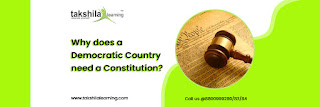The democratic country need a constitution - Social Science Class 8
Assume you're organising an outing with a group of buddies. Akshay, one of your friends, wants to see a movie. Trisha, one of your friends, has expressed an interest in visiting the mall. You wish to visit a bowling alley. Akanksha, one of your friends, also wants to see a movie. You should all go to a movie, according to the majority. Imagine if no one agreed!
You decide to stick to your guns, Trisha sticks to hers, and Akshay and Akanksha refuse to change their minds. Do you see what's going on? Your outing would eventually be canceled, and you'd all miss out on some great fun!
So there would be no order in the world if everyone did as they pleased!
As a result, in order for a country to be in order, laws and regulations must be established. A democracy, on the other hand, allows its population to choose who will be in charge of the country. As a result of universal suffrage, a democratic government permits the general people to elect its leaders. Universal suffrage refers to practically all adults (those above the age of 18) having the opportunity to vote for their preferred leader among the competing candidates.
Let's look at why a democratic country needs a constitution in greater detail below —
- The political system is built on the principles of the Constitution.
- It establishes laws to safeguard the interests of society's citizens and leaders.
- The Constitution establishes guidelines for decision-making by leaders.
- It forbids leaders from abusing their positions of authority.
- Leaders are given a legal framework that makes it easier for them to make decisions for the country.
- It assures that no one is discriminated against because of their religion, caste, or gender.
- Citizens' fundamental rights to social, economic, and political well-being are guaranteed by the Constitution.
- It refers to a set of guidelines that allow people of various religions and communities to coexist peacefully.
- Citizens' behaviour expectations are formed.
- It establishes legislation to defend minority' interests and to prevent majority dominance over minorities.
Read more
Components of the Constitution of India
Tag - class 8 social science; Why does a democratic country need a constitution class 8; online classes for school; NCERT class 8;

Comments
Post a Comment
Thank you we will contact ASAP.